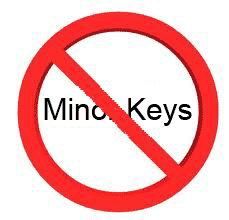No minor keys?

Have been listening to a lot of Prokofiev lately, especially the piano sonatas and realised that I knew very little about his life. So I’m enjoying the Life and Times book on him by Thomas Schipperges. He gives you a paragraph’s description of Social Realism, which at its initial launch in 1934 at the Soviet Writer’s Conference, laid down its crass ideas that pessimism was anti-social (goodbye Eastenders!) and that music should be hummable and in major keys.
The book adds that a similar dictum was laid down by Irving Thalberg (1899-1936), the Hollywood producer, who in the 1930s sent the following memo to resident composers: ‘from the above date forward, no music in an MGM film is to contain a minor chord.’ This memo was still bolted to the wall 25 years later, when composers such as André Previn were there.
Thalberg died very young, having suffered from heart disease all his life, and that sharp sense of his own mortality may have affected his ability to cope with sad music! (I’m being kind, because personally I always think that people who don’t write music should leave the decisions up to those who do). Now I want to see Thalberg’s movies to see how many minor chords the composers managed to get past him! I am reminded of writing a piece for a male voice choir: I knew they were very limited in their abilities, so I decided to write a piece with no discords in it. I tried to make it sound strange and keep some tension going without introducing any dissonances. I found this so challenging and engrossing that I put No Discord Series No. 1 on the front page, thinking I would do more. The score was sent off and after a long pause came back: the choir was unable to perform the piece as there were ‘too many discords!’ Obviously, no-one had looked too closely at the title page, but it was more that (I felt) the newness of the music had brought its own discord into their lives. I wonder how many minor chords MGM’s composers could get into their scores just by presenting them in a certain way. I’ve always found it moving that Mozart often writes his most painful music in major keys, as if the reminiscence of sweetness is unbearable. I wonder whether Irving would have heard that music as if in a minor key? Film music of that time sometimes does something similar – a particularly poignant scene is often accompanied by a saccharine tune like ‘Home Sweet Home’ which is somehow more tear-jerking than a sad melody.
Composers are often forced to reinvent their music to suit dictators and governments: they could leave as Stravinsky or Rachmaninoff did, and Prokofiev did leave for a while. But he came back to Russia, for subtle and complex reasons no-one has ever quite been able to fathom. Other composers manage to stay afloat and stay unique despite the politics – Thomas Tallis springs to mind. I wonder what I would do in such threatening circumstances?
Back in the 70’s, I was told that my music needed to be ‘forced into a modern idiom,’ even though I was writing far more difficult and dissonant music than I write now. I felt very threatened by the atmosphere of that music world, and totally outside it, but my life was not threatened and so I had an easy choice to keep doing my own thing, rather than toeing the party line. Now it is as if the coin as been flipped right over, for now we often read in what music commentary there is these days, that new music should try harder to be accessible, that composers have a duty to write music that people like. In other words, that is hummable and without any anti-social pessimism! This has been going on for some time, and back in the previous century I went to a debate – I remember Roger Scruton was speaking – about how new music should be nicer. He didn’t say that of course, but he wanted keys and melodies, and I presume that he is a much happier man now. It has been a peculiarly English revolution, bloodless in more ways than one. We love foreigners, so we have swopped Boulez for Eric Whitacre. Conformity is the name of the game, whether it is the enforced atonality of my student days, or the holy wallpaper or quasi pop of today, it is in its own way a kind of oppression – oppression that has to be resisted. My personal motto has always been that all anyone can ask of me is that I tell the truth as I see it.
As is well known, Stalin died one hour after Prokofiev, they even died of the same thing. Prokofiev’s death was barely mentioned in the newspapers and there were no flowers at his funeral, due to the total hysteria over Stalin’s death. However, ten years later, Prokofiev’s anniversary was front page news, while Stalin’s was only celebrated in Georgia.
